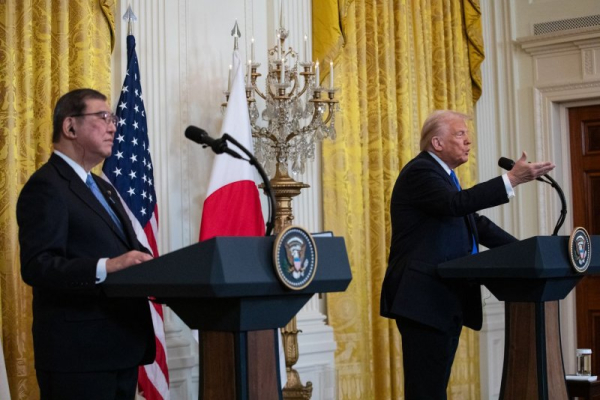State Department official meets with counterparts in Japan in effort to strengthen trilateral partnership.


President Donald Trump holds a press conference with Japanese Prime Minister Shigeru Ishiba in the East Room of the White House in Washington, D.C., this past February. On Friday, ministers from the United States, Japan and South Korea met to discuss keeping the Indo-Pacific region safe and stable. File photo by Anna Rose Layden/UPI | License Photo
U.S. Deputy Secretary of State Christopher Landau discussed security and commerce when he met with Japanese Vice Foreign Minister Funakoshi Takehiro and South Korean First Vice Foreign Minister Park Yoonjoo in Osaka, Japan, on Friday.
The goal of the meeting was to advance the countries’ trilateral partnership, which is “critical for the safety, security, and prosperity of our three countries,” State Department Spokesperson Tammy Bruce said in a press release.
The three “emphasized their commitment to maintaining a free and open Indo-Pacific and discussed efforts to ensure peace and stability in the region,” Bruce said.
The security of the region is always tense, thanks to North Korea and its alliances with China and Russia.
On Thursday, a United Nations report showed evidence that North Korea many times shipped arms and material to Russia, which trained North Korean troops for combat against Ukrainian forces, Seth Bailey, the U.S. State Department’s director for Korean and Mongolian Affairs, told U.N. members.
At the Osaka meeting, the three reaffirmed their resolute commitment to the complete denuclearization of North Korea and expressed serious concerns about its increasing military cooperation with Russia. They discussed the importance of strengthening deterrence and resilience against regional security threats, Bruce said.
One of those threats came last weekend, when Russian Foreign Minister Sergey Lavrov visited North Korea and expressed support for the hermit country.
“No one is considering using force against North Korea despite the military buildup around the country by the United States, South Korea and Japan,” Lavrov said of the joint military exercise that took place in South Korea the day before.
“We respect North Korea’s aspirations and understand the reasons why it is pursuing a nuclear development,” he said.
Landau, Funakoshi and Park reiterated their commitment to strengthening supply chains and collaborating on emerging technologies to boost their economic cooperation, Bruce added.
They agreed Japanese and Korean participation in the Alaska Sustainable Energy Conference in June sent a strong signal about the importance of energy security underpinned by unleashing American liquified natural gas.
The U.S.-Japan bond was shaken last week, though, when President Donald Trump said he planned to impose a 25% tariff on Japan starting in August. Though hurt by the statement, Japan said it will continue to negotiate with the president.
“The real climax and critical moment are the three weeks until Aug. 1,” Japan’s Minister of Economic Revitalization Ryosei Akazawa said. “We would like to support the government’s negotiations more firmly than ever before.”
The United States has a $57 billion trade deficit with Japan with $84.95 billion exports from the United States and $141.52 billion imports in 2024, according to the United Nations COMTRADE database.